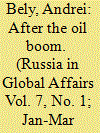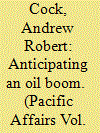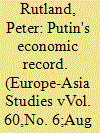| Srl | Item |
| 1 |
ID:
087878


|
|
|
|
|
| Publication |
2009.
|
| Summary/Abstract |
Record-high oil prices in the recent years brought an illusion with Russian oil and gas companies that their easy profits would continue forever. The financial crisis and the subsequent recession have taught them a harsh but useful lesson: even enormous hydrocarbon resources are not enough for prosperity.
Five Russian majors (Rosneft, LUKoil, TNK-BP, Surgutneftegaz and Gazprom-Oil) have more energy resources than the leading Western companies, while Gazprom is the world's leader in natural gas resources. However, the Russian corporations are behind their major rivals in terms of capitalization and stable position on the market. Owing to their diversified investment structure, international oil and gas companies influence the formation of the norms that provide stability both inside and beyond individual countries. Even their occasional performance setbacks in underdeveloped countries do not undermine their reputation as successful global players. Stability in the market helps them counteract the volatility of oil prices.
When oil prices were high, Russian companies could easily attract financial capital. Short-term profits earned them stable credit ratings and encouraged them to take long-term loans for large investments. However, the liquidity crisis froze many long-term investment projects
|
|
|
|
|
|
|
|
|
|
|
|
|
|
|
|
| 2 |
ID:
098380


|
|
|
|
|
| Publication |
2010.
|
| Summary/Abstract |
By mid-decade, Cambodia will likely begin production of offshore oil fields containing an estimated 700 million to two billion barrels of oil and significant quantities of natural gas. This long anticipated event has prompted considerable discussion of whether petroleum-derived wealth will be a blessing or a curse. Much of the discussion has been framed through the lens of the "resource curse" thesis. The purpose of this article is to consider how the notion of a resource curse has entered the Cambodian political arena and to examine the questions it has prompted Cambodia's ruling elite and external actors to ask concerning the management of petroleum resources. Based on a systematic examination of the evolution of government policy, and of external attempts to shape its development, I show how warnings of a "resource curse" have come to be deployed in different ways by reform promoting aid donors, civil society groups, and the ruling elite. The article concludes by noting that while these warnings have helped to highlight risks associated with the rapid exploitation of petroleum resources, little will or capacity exists either domestically or internationally to transcend technical fixes to the pathologies of petroleum revenue wealth and to press for a more transparent exploitation regime.
|
|
|
|
|
|
|
|
|
|
|
|
|
|
|
|
| 3 |
ID:
084651


|
|
|